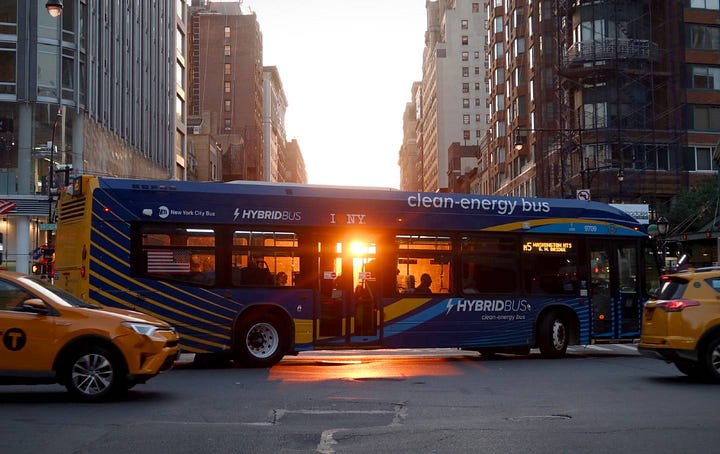Basic Income Battles, Direct Democracy’s Impact, and Electric Buses Powering Change
Explore the clash over guaranteed income, the role of direct democracy in shaping health policy, and how electric and free buses are driving sustainability forward.




Hello Political Reading Recap readers,
Let’s dive into a topic that I had sent to me from
:If you want to be featured in future newsletters, comment below a question that you want me to answer or make a suggestion for news topics you want covered in future newsletters.
While Michael Magoon critiques Universal Basic Income’s feasibility alongside welfare programs, I see UBI as a transformative dividend of shared national wealth, providing not just economic security but fostering a culture of hope and creativity. UBI redefines daily life, shifting society from mere survival to thriving, freeing individuals from the fear of scarcity, and fostering collaboration and ecological sustainability. By consolidating inefficient welfare programs, UBI can transcend ideological divides and create a foundation for a just, harmonious society where everyone can reach their full potential.
Rather than running alongside a web of inefficient means-tested programs, UBI should consolidate and replace them where possible. The complexity and inefficiencies inherent in means-tested welfare often create barriers for recipients, resulting in administrative bloat. By shifting to a UBI model funded partly through this consolidation, we address the deeper issue: why means-tested programs frequently fall short of their goals. Means-tested programs can be inefficient because they often exclude people who need them the most due to complicated eligibility requirements, stigmatization, or bureaucratic hurdles.
With UBI, the focus shifts from paternalistic oversight to economic empowerment. It provides a foundation of financial security, giving citizens the freedom to make choices that improve their lives, from investing in education to starting small businesses, or simply weathering difficult times. More importantly, defining UBI as a national dividend establishes a direct connection between the wealth of the nation — whether from natural resources, technological progress, or economic growth — and the well-being of its people. Every citizen would benefit from the nation's prosperity.
The debate around UBI is often framed in terms of feasibility, but I believe the true question is how we define our social contract. By redefining UBI as a form of shared economic ownership and consolidating inefficient welfare programs, we have an opportunity to create a more just and empowered society.
With that topic covered let’s now preview what’s featured in each section of this week’s Political Reading Recap.
Basic Income: We examine the impact of guaranteed income programs, the backlash they face, and their potential to address systemic issues like racism and economic instability.
Democracy: This section delves into the role of direct democracy in health policy, the controversial electoral reforms in Mexico, and the latest updates on Donald Trump’s legal battles.
Sustainability: We explore innovative solutions to climate change, including fare-free public transportation, electric school buses, and new technologies to combat drought and pollution.
Other News: Topics include national security concerns over the sale of U.S. Steel, the potential for peacekeeping operations in Haiti, and the worsening hunger crisis in America.
Basic Income
Sam Altman-Backed Study on Guaranteed Income: Could basic income work? - This article explores the findings of a study backed by OpenAI CEO Sam Altman, which shows that guaranteed income can improve financial stability and well-being for low-income families. It’s a compelling case for the benefits of unconditional cash transfers.
Right-Wing Think Tank Pushes States to Ban Guaranteed Income Programs: Opposition to guaranteed income - Despite the popularity of guaranteed income programs, a right-wing think tank is influencing GOP lawmakers to ban them. This article highlights the political challenges these programs face and their potential impact on poverty reduction.
Guaranteed Income Program in Texas Faces Backlash: Helping Texas families - This piece discusses the positive outcomes of guaranteed income pilots in Texas, despite facing significant opposition. It underscores the importance of these programs in providing economic stability and improving mental health.
Reparations and Basic Income in Louisiana: Addressing systemic racism - A unique program in Louisiana combines reparations and basic income to support victims of police racism. This article highlights the symbolic and practical benefits of such initiatives in addressing historical injustices.
New Initiative by a Foundation on Guaranteed Basic Income: Innovative approach to basic income - The Steelcase Foundation’s new initiative provides guaranteed income to mothers in Michigan, aiming to strengthen families and communities. This article explores the potential long-term benefits of this program.
AI and Universal Basic Income: AI’s impact on the economy - As AI continues to transform the job market, this article argues that universal basic income could be a solution to job displacement and economic instability. It’s a thought-provoking look at the future of work and income security.
Democracy
Direct Democracy and Population Health: Health policy through state ballots - This article examines how direct democracy can influence health policy, highlighting the potential for state ballot initiatives to improve public health outcomes.
AMLO’s Electoral Reform in Mexico: Controversial reforms - Mexican President Andrés Manuel López Obrador’s electoral reforms have sparked debate over their impact on democracy. This article delves into the potential consequences of these changes.
Donald Trump’s Hush Money Sentencing: Legal battles continue - The latest update on Donald Trump’s legal issues, focusing on the delay of his sentencing in the New York hush-money case. This article provides insights into the ongoing legal challenges facing the former president.
Sustainability
New York City Bus Free Fare Pilot: Fare-free public transportation - New York City’s pilot program for fare-free buses aims to increase ridership and reduce emissions. This article explores the potential benefits and challenges of this initiative.
Electric School Buses as Grid Batteries: Innovative energy solutions - The largest electric school bus project in the U.S. is now live, using buses as grid batteries. This article highlights the environmental and economic benefits of this innovative approach.
Geoengineering to Reverse Global Warming: Combating climate change - This piece discusses various geoengineering techniques to reverse global warming, including their potential risks and benefits.
Cloud Seeding to Fight Drought in Italy: Weather modification - Italy is exploring cloud seeding as a method to combat drought. This article examines the effectiveness and potential drawbacks of this technique.
Cloud Brightening Over Oceans: Climate intervention - Cloud brightening is being considered as a way to stave off climate change. This article discusses the science behind this method and its potential impact.
New Filtration Material for Water Pollution: Innovative water treatment - MIT researchers have developed a new filtration material that could remove long-lasting chemicals from water. This article explores the potential applications and benefits of this breakthrough.
Nuclear Energy in New York: State’s climate goals - New York Governor Kathy Hochul is pushing for nuclear energy to meet the state’s climate goals. This article discusses the role of nuclear power in achieving sustainability.
Effective Climate Policies: Closing the emissions gap - While many climate policies fail, a few successful ones could significantly reduce emissions. This article highlights the most effective strategies for combating climate change.
Technological Innovations Driving the Circular Economy: Sustainable solutions - This piece explores three technological innovations that are driving the circular economy, emphasizing their potential to reduce waste and promote sustainability.
Other News
California’s Home Loan Program for Immigrants: Governor Newsom’s Veto - California’s new program aims to help immigrants secure home loans but Governor Newsom decided it wasn’t in the best interest of California. This article discusses the benefits and challenges of this initiative and why the Governor decided to veto it.
Venezuelan Gang Tren de Aragua: Recent headlines - This piece provides an overview of the Venezuelan gang Tren de Aragua, which has been making headlines recently. It explores the gang’s activities and impact on the region.
Biden’s National Security Concerns Over U.S. Steel Sale: Blocking the sale - President Biden indicates he may block the sale of U.S. Steel on national security grounds. This article discusses the implications of this potential decision.
Peacekeeping Operation in Haiti: Securing aid - The U.S. is considering a peacekeeping operation in Haiti to secure money and equipment. This article examines the potential benefits and challenges of such an intervention.
World War III: Fewer U.S. troops died under Biden-Harris - This piece compares the number of U.S. troop casualties under the Biden-Harris administration to those under Trump, highlighting the differences in military strategy.
Higher Education and National Security: Reasserting ties - This article argues that higher education should strengthen its ties to national security, emphasizing the importance of education in maintaining national stability.
Teen Vaping Crisis: Addressing the issue - The rise of teen vaping and the popularity of products like Elf Bar and Zyn are causing concern. This article discusses the health risks and potential solutions.
Kamala Harris Proposes Tax Break for Small Businesses: Supporting small businesses - Vice President Kamala Harris proposes a $50,000 tax break for small businesses. This article explores the potential impact of this policy on the economy.
Hunger in America: Worsening crisis - A new USDA report reveals that hunger in America is getting worse. This article examines the factors contributing to this crisis and potential solutions.





The more I think about UBI, the more I have to shrug my shoulders. Here’s why: It depends.
First, we must understand that what we call “economic growth” is the accumulation of knowledge over time. That’s all. The problem we face this century is falling populations (fewer humans to solve problems) and the innovation Red Queens Race: https://www.lianeon.org/p/the-innovation-red-queens-race. In other words, economic growth is poised to slow dramatically, and soon.
Knowing this, in a normal economy with slowing growth rates, the cost/benefit of a true UBI doesn’t appear to make much sense, though some cheaper and more targeted variants might.
But as some believe (new essay coming on this soon too) AI could replace human cognitive labor and could learn and improve faster than we can, it can generate these ideas for us and kickstart…dare I say…accelerate economic growth to unimaginable levels, perhaps 10 times faster.
While historically human labor has always been able to move to “something new” when automation arrives. AI could be different because in order for such growth rates to be achieved it must replace human cognitive/physical labor. In such a scenario, it’s hard to imagine there being many jobs left for humans to do but there will be tremendous wealth and abundance to draw from. The benefit/reward of UBI suddenly begins making sense.
In other words, until we know the trajectory of growth, we probably cannot answer any questions on the merits of UBI. As is stands currently, the math is questionable, but in 10-15 years…it may not be.